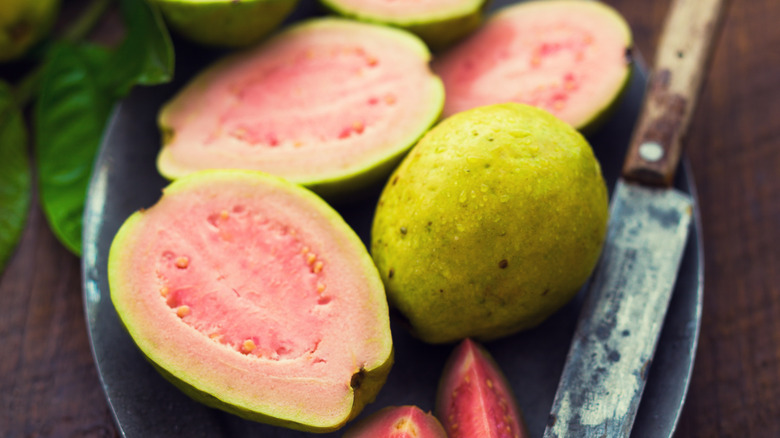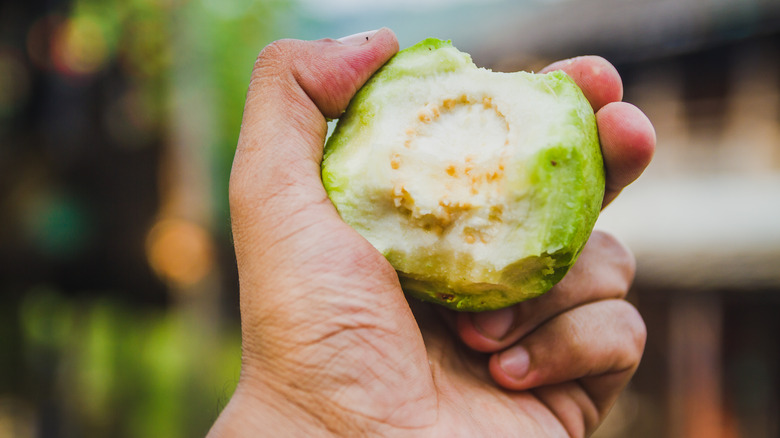Eating This Underrated Tropical Fruit Can Help Lower High Cholesterol
About 86 million adults in the U.S. aged 20 or older have high cholesterol, with 25 million falling into the dangerous category, per the Centers for Disease Control and Prevention. Just to clarify, your cholesterol levels mean more than you think. High cholesterol is calculated with a few factors in mind: your total cholesterol level, along with high-density lipoprotein (HDL) or good cholesterol, low-density lipoprotein (LDL) or bad cholesterol, and triglycerides. While not all cholesterol is bad for you (some actually serve a purpose), maintaining healthy levels is important.
Your levels matter for a number of reasons, the primary of which is heart disease risk. For example, having unhealthy cholesterol levels can lead to plaque buildup in your arteries and put you at risk of angina, stroke, or heart attacks. Improving your numbers, more often than not, involves lifestyle changes. Doctors will tell you to eat healthy, avoid saturated and trans fats in your diet, increase your fiber intake, get physically active, stop smoking, limit alcohol consumption, and lose weight. Sometimes, medications like statins are involved.
But did you know that there's an underrated tropical fruit that could work wonders for your cholesterol levels if included in your diet? We're referring to the sweet and refreshing guava, native to Central America.
Guava's effects on high cholesterol levels
According to a 2016 randomized controlled study published in the Journal of Clinical and Diagnostic Research, consuming guava pulp (made from the vibrant red flesh of the fruit) without the peel had a significant and favorable effect on both lipid levels and blood sugar levels. More specifically, it lowered blood sugar, serum total cholesterol, triglycerides, and LDL cholesterol levels while also increasing HDL cholesterol levels. An older study published in the American Journal of Cardiology had similar results.
Science seems to point toward the beneficial soluble fiber content in the tropical fruit, which has a hypocholesterolemic (total cholesterol and LDL cholesterol-lowering) effect on the body. In addition to fiber, guava is packed full of antioxidants like vitamin C and vitamin A, and other nutrients like calcium, iron, and potassium. You can't talk about high cholesterol levels without considering overall heart health, and guava is thought to be beneficial for heart health too for a few different reasons.
Guava and heart health
The antioxidants, fiber, and potassium in this yellow or light green-skinned fruit are thought to be beneficial for heart health. For example, a 2016 study published in the International Journal of Biological Macromolecules found that guava contains antioxidant effects that protect your heart from free radical damage.
Potassium contributes to heart health in a few different ways: by helping to lower blood pressure levels, protecting against strokes, and regulating your heartbeat. Other indirect ways in which guava consumption can aid your heart are via its low calorie profile (which aids in weight loss) and antioxidant and fiber content (which helps lower blood sugar levels). Diabetes and high blood glucose levels, along with obesity, are considered risk factors for heart disease.
In addition to lowering cholesterol levels and heart health, guava and its nutritional profile are associated with other health benefits like healthy digestion, preventing painful menstruation, combating cancer (though this is more the guava leaf extract), relieving diarrhea (again, more the leaf), better skin health, and boosting your immune system. Red flesh aside, guavas come with white insides too. That being said, if you're thinking of adding guava to your diet as one of the foods you eat for high cholesterol, you may want to first speak with your doctor about a holistic approach to managing your cholesterol levels. Diet is only one component, and your healthcare provider would have a better idea based on your blood tests to decide what you should be doing.



